Ethics into Action
Ethics into Action
Learning from a Tube of Toothpaste
Peter Singer
ROWMAN & LITTLEFIELD
Lanham Boulder New York London
Published by Rowman & Littlefield
An imprint of The Rowman & Littlefield Publishing Group, Inc.
4501 Forbes Boulevard, Suite 200, Lanham, Maryland 20706
www.rowman.com
6 Tinworth Street, London SE11 5AL
Copyright 1998 by Rowman & Littlefield Publishers, Inc.
Preface to 2019 Edition copyright 2019 by Rowman & Littlefield Publishers, Inc.
All rights reserved . No part of this book may be reproduced in any form or by any electronic or mechanical means, including information storage and retrieval systems, without written permission from the publisher, except by a reviewer who may quote passages in a review.
British Library Cataloguing in Publication Information Available
Library of Congress Cataloging-in-Publication Data
Singer, Peter.
Ethics into action : Learning from a tube of toothpaste/ Peter Singer.
p. cm.
Includes bibliographical references and index.
ISBN 978-1-5381-2389-8 (alk. paper)
ISBN 978-1-5381-2390-4 (electronic)
1. Spira, Henry, 1927-. 2. Animal rights activistsUnited StatesBiography. 3. Animal rights movementUnited StatesHistory. I. Title.
HV4764.S69S55 1998
179'.3'092dc21
[B]98-6157
CIP
 The paper used in this publication meets the minimum requirements of American National Standard for Information SciencesPermanence of Paper for Printed Library Materials, ANSI/NISO Z39.48-1992.
The paper used in this publication meets the minimum requirements of American National Standard for Information SciencesPermanence of Paper for Printed Library Materials, ANSI/NISO Z39.48-1992.
Printed in the United States of America
If you see something thats wrong, youve got to do something about it.
HENRY SPIRA
Contents
Preface
O n April 15, 1980, the New York Times ran a startling full-page advertisement. In the middle of the page was a picture of a white rabbit with bandages over both eyes, next to two glass laboratory flasks. Across the top of the page three lines of heavy black type asked a single question: How many rabbits does Revlon blind for beautys sake? The text began under the picture:
Imagine someone placing your head in a stock. As you stare helplessly ahead, unable to defend yourself, your head is pulled back. Your lower eyelid is pulled away from your eyeball. Then chemicals are poured into the eye. There is pain. You scream and writhe hopelessly. There is no escape. This is the Draize Test. The test which measures the harmfulness of chemicals by the damage inflicted on the unprotected eyes of conscious rabbits. The test that Revlon and other cosmetic firms force on thousands of rabbits to test their products.
The advertisement gave precise figures for the number of rabbits Revlon used. It quoted scientists who said that the test was unreliable and that alternatives to it that did not use animals could be developed. Then it asked readers to write to Revlons president and report that they would not use Revlon products until Revlon funded a crash program to develop nonanimal eye irritancy tests.
Roger Shelley was Revlons vice president for investor relations on the day the advertisement appeared. Later he said,
I knew the stock was going down that day, but more importantly I knew the company had a very significant problem that could affect not just one days stock price trading, but could cut to the core of the company. In fact if it werent really well handled, it would have such a deleterious effect that it could theoretically wipe Revlon off the face of the counter in drugstores and department stores.
Shelley was soon put in charge of the unenviable task of handling the problem. A smooth-voiced, immaculately groomed, and elegantly dressed representative of a corporation that prides itself on its refined image, he soon found himself talking to Henry Spira, a bushy-haired New York high school teacher who spoke with a broad accent that came from years spent on ships as a sailor in the merchant marine and on the General Motors assembly line in New Jersey. Shelley saw that Henrys clothes were crumpled, that he rarely wore a tie, and that when he did, he seemed incapable of getting it to meet his collar. But that wasnt all that Shelley noticed: There was not one ounce of product on his body that was produced by an animal, and that included his belt, that included shoes, that included everything. Here was a man who did what he said he would do.
Does living according to your beliefs help you to win a battle with a billion-dollar corporate giant? Could there be a more unequal contest than this one, which pitted a high school teacher working out of his own apartment against the flagship of the cosmetics industry? Those who had studied Henrys past record, however, would not have dismissed his prospects of success. They would have known that he had already tackled FBI director J. Edgar Hoover, corrupt union bosses buttressed by hired thugs, the august American Museum of Natural History in New York City, and the New York state legislature. If he had not always got what he wanted, his record was improving. So it was to prove in this case. Before the year was over, Revlon agreed to donate $750,000 to Rockefeller University for a three-year research project aimed at finding nonanimal alternatives to testing cosmetics on the eyes of rabbits. It was the first step toward putting the words Not tested on animals on cosmetic products.
For more than a century, antivivisection societies had been campaigning against animal experiments without having the slightest impact. They were dismissed as cranks. While they put out their strongly worded leaflets condemning animal experimentation, the number of animals used in research grew from a few hundred a year to an estimated 20 million. Yet in his very first campaign, Henry brought to an end a series of experiments that involved examining the sexual behavior of mutilated cats. From there he went on to tackle such organizations as Revlon, Avon, Bristol-Myers, the Food and Drug Administration, and Procter & Gamble. Turning then to the even more intractable problem of the suffering of animals used for food, he targeted the chicken producer Frank Perdue, several major slaughtering companies, the U.S. Department of Agriculture, and McDonalds. In twenty years, his unique campaigning methods have done more to reduce animal suffering than anything done in the previous fifty years by vastly larger organizations with millions of dollars at their disposal.
Indirectly, I played a role in these events. It was my article Animal Liberation, published in the New York Review of Books in 1973, that made Henry think seriously of animals as a group in need of someone to act on its behalf. More effectively than anyone else, he has taken my ideas and forged them into a weapon for reducing the pain and suffering that animals must endure. I have written this book to show how he has done it. An account of Henrys life as a campaigner can serve as a handbook for activists, not just in the animal movement, but for many other ethical causes as well. But that is not the only reason why I find the story of Henrys life worth telling. It serves as a counterexample to two pervasive and dispiriting assumptions about what we can do with our lives.
The first of these assumptions is that society has become too big and too complex for an individual to make a difference unless, perhaps, that individual has extraordinary wealth or the good fortune to rise to the top of a major organization. After all, our societies consist of tens or hundreds of millions of people. Our governments are tied down in bureaucracy and fear doing anything that could lose them votes. Multinational corporations, with annual profits running into billions of dollars and advertising budgets to match, wield such formidable power over public opinion that the biggest organizations of consumers cannot hope to match them. How, then, could an individual possibly bring about any significant change?
Next page
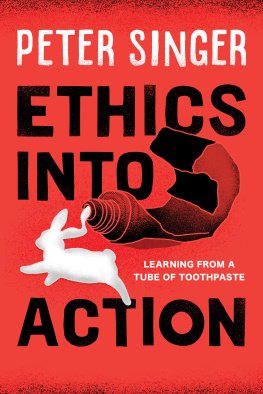
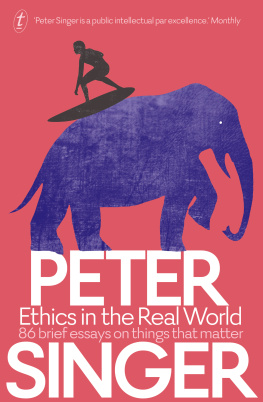

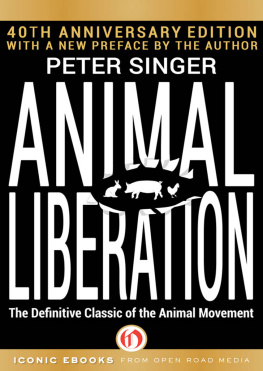


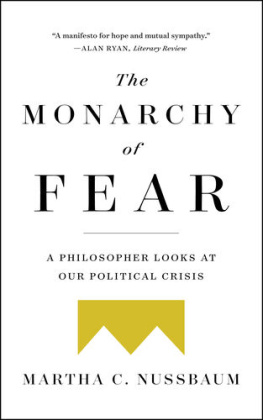
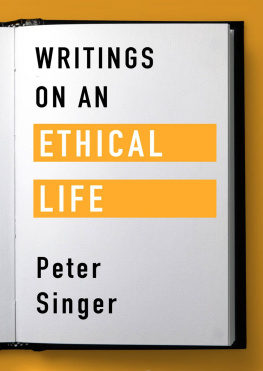
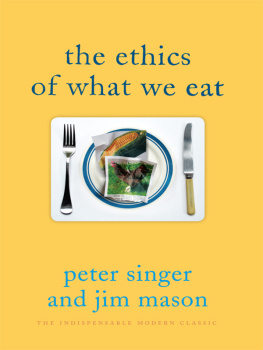

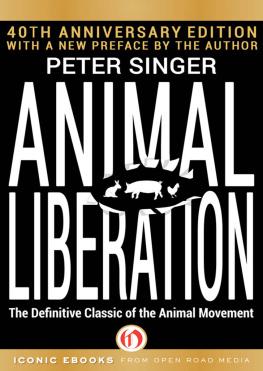
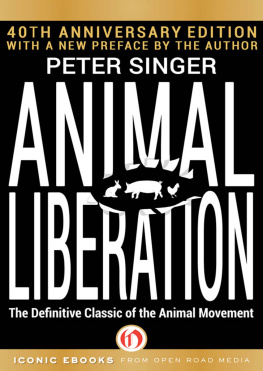
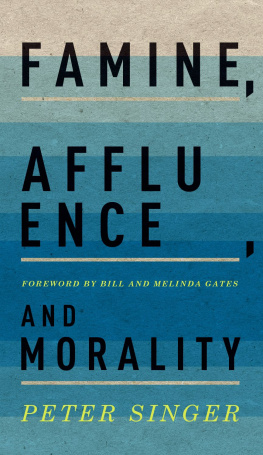

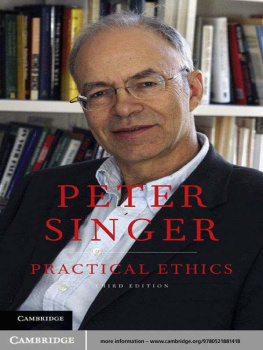
 The paper used in this publication meets the minimum requirements of American National Standard for Information SciencesPermanence of Paper for Printed Library Materials, ANSI/NISO Z39.48-1992.
The paper used in this publication meets the minimum requirements of American National Standard for Information SciencesPermanence of Paper for Printed Library Materials, ANSI/NISO Z39.48-1992.